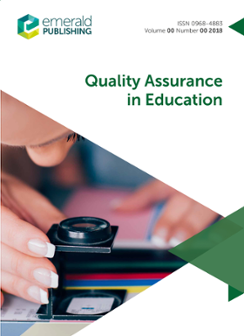Quality Assurance in Education
Issue(s) available: 125 – From Volume: 1 Issue: 1, to Volume: 32 Issue: 4

Volume 32
Volume 31
Volume 30
Volume 29
Volume 26
Volume 25
Volume 23
Volume 22
Volume 20
Volume 16
Effect of institute and LMS service quality on HEI Brand Equity: an empirical investigation
Rashmi Mishra, Abhishek Mishra, Veenus Tiwari, Rajendra Kumar JainThe purpose of this paper is to examine the education service quality factors, for online education context, that drive the brand equity of a higher education institute. In the…
Identifying challenges in implementing digital transformation in UK higher education
Shalu Saini, Kasun Gomis, Yiannis Polychronakis, Mandeep Saini, Stylianos SapountzisThe purpose of this study is to systematically dissect strategies against the challenges stalling digital transformation (DT) in the UK higher education (HE) sector. It addresses…
Readiness of Islamic Higher Education Institutions in Indonesia for future quality assurance
Mochamad Iskarim, Aenurofik, JunaetiThis study aims to assess the readiness of Islamic Higher Education Institutions (IHEIs) to enter the third wave of education or future quality assurance.
Teacher perspectives of ChatGPT as a pedagogical tool in the K-12 setting: a case study
Tiffani BatemanThe purpose of this exploratory qualitative case study is to gain a deeper understanding of teacher experiences and perspectives of ChatGPT as a pedagogical tool.
Experimental evidence for the efficacy of generative AI in improving students’ writing skills
Chinaza Solomon Ironsi, Sarah Solomon IronsiGiven continued debates on the potentials of newly emerging artificial intelligence (AI) like generative AI (GenAI), this study aims to contribute to corporal studies by…
AI-enhanced education: exploring the impact of AI literacy on generation Z’s academic performance in Northern India
Ekamdeep Singh, Prihana Vasishta, Anju SinglaArtificial intelligence (AI) has the potential to address significant challenges in education, innovate learning and teaching practices and achieve SDG 4. However, existing…
Generative AI: hopes, controversies and the future of faculty roles in education
Samar Aad, Mariann HardeyGenerative artificial intelligence (GAI) has seen exponential growth in recent years due to its capability to generate original content through natural language processing and…
Faculty perspectives on accreditation, academic freedom and quality learning in private higher education institutes: empirical evidence
Mohammad Ali Ashraf, Sarker Rafij Ahmed Ratan, Tanzila Amir, Mohd Hasanur Raihan Joarder, Abu Rashed OsmanThis study aims to investigate the effects of standardization, accreditation process on academic freedom and quality learning in higher education institutes (HEIs). In addition…
An investigation of generative AI in the classroom and its implications for university policy
Eric J. Hamerman, Anubhav Aggarwal, Chrissy MartinsThe emergence of widely available Generative Artificial Intelligence (GenAI) tools, such as ChatGPT, presents both opportunities and threats for higher education. This study aims…
The impact of gamification on meaningful learning and student performance in an undergraduate online engineering course
Cecilia Madero-Gonzalez, Jesus Vazquez-Hernandez, Fernando Gonzalez AleuThis study aims to examine the impact of gamification on the five dimensions of meaningful learning (i.e. cooperative, active, authentic, constructive and intentional learning…
Stakeholders’ involvement in economics and management programs quality assurance
Tatiana Mazza, Stefano AzzaliThis study aims to investigate the stakeholders’ (employers and students) involvement in economics and management programs quality assurance in Italian universities from the…
Toward a satisfactory sustainable education for international students: a qualitative framework for international accounting students
Arash Arianpoor, Saba Sabah Dheyab Al-Ani, Hameed Mohsin KhayoonThis study aims to provide a qualitative framework for satisfactory sustainable education for international accounting students using a meta-synthetic approach.
Improving school mindfulness: analysing the impact of principals’ effective communication and teachers’ trust on schools’ organisational mindfulness in Kuwait
Munirah AlajmiThis paper aims to investigate the influence of school principals’ effective communication and teachers’ trust in principals on schools’ organisational mindfulness from the…
A conceptual analysis of artificial intelligence (AI) on academic opportunities and challenges: a case study based on higher educational institutions in Bangladesh
Marzia Tamanna, Bijaya SinhaThe purpose of this paper is to provide an in-depth analysis of the challenges associated with using artificial intelligence (AI) in academic research and suggest various…
Influence of academic leadership on organizational commitment of faculty members in private sector universities: mediating role of work engagement
Umer Yaseen, Rana Nadir Idrees, Muhammad Haseeb Shakil, Sayyed Zaman Haider, Junaid KhalilThis study aims to investigate the impact of academic leadership on the organizational commitment of faculty members in private universities in Punjab. Work engagement was…
ISSN:
0968-4883e-ISSN:
1758-7662ISSN-L:
0968-4883Online date, start – end:
1993Copyright Holder:
Emerald Publishing LimitedOpen Access:
hybridEditors:
- Dr Jeffrey W Alstete
- Dr Heidi Flavian
- Dr Krassie Petrova
